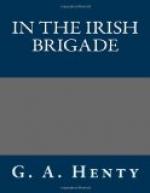“I should have thought that you would all have liked that,” Desmond said, in some surprise.
“Enough is as good as a feast,” the other said; “and when you have done a few weeks’ work in trenches, before a town you are besieging; stood knee deep for hours in mud, soaked to the skin with rain, and with the enemy’s shot coming through the parapet every half minute or so; you will see that it is not all fun and glory.
“Then, too, you see, we have no particular interest in the quarrels between France and Germany. When we fight, we fight rather for the honour of the Irish Brigade, than for the glory of France. We have a grudge against the Dutch, and fight them as interested parties, seeing that it was by his Dutch troops that William conquered Ireland. As to the English troops, we have no particular enmity against them. Cromwell’s business is an old story, and I don’t suppose that the English soldier feels any particular love for Queen Anne, or any animosity against us. And after all, we are nearer in blood to them than we are to the Germans, Austrians, or Spaniards, for there are few, even of our oldest families, who have not, many times since the days of Strongbow, intermarried with the English settlers. At any rate, there are still plenty of adherents of King James in England and Scotland. We speak the same language, and form part of the same nation, and I own that I would rather fight against any foreign foe than against them.”
“So would I,” Desmond said heartily. “Our only point of difference is that we don’t agree as to who should be king. We want a Catholic king, and the majority of the English want a Protestant king. We have fought on the subject, and been beaten. Next time, we hope that we may succeed. If the king were to land in England again, I would fight heart and soul in his cause; but whether the French beat the English, in the present war, or the English beat the French, will not, as far as I can see, make much difference to King James; who, Father O’Leary tells me, is, in his opinion, supported here by the French king from no great love for himself, but because, so long as James has adherents in Ireland, Scotland, and England, he is able to play him off against the English Government.”
The other young men laughed.
“For heaven’s sake, Kennedy, keep such sentiments as these to yourself. It is a matter of faith, in our brigade, that we are fighting in the cause of King James, as against the English usurper. Now that William is dead, and James’s daughter on the throne, matters are complicated somewhat; and if the Parliament had settled the succession, after Anne, on her brother, there might have been an end of the quarrel altogether. But now that they have settled it on Sophia of Hanover, granddaughter of James the 1st, and her descendants, subject to the restriction that they shall be Protestants, the quarrel does not seem likely to be healed.”
“This priest of yours must be a dangerous man,” O’Sullivan said.




